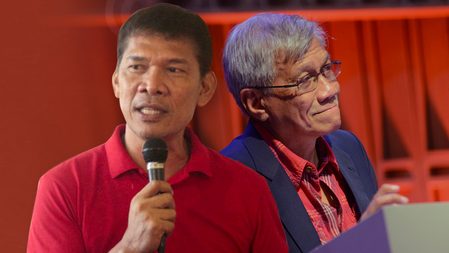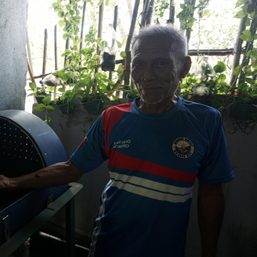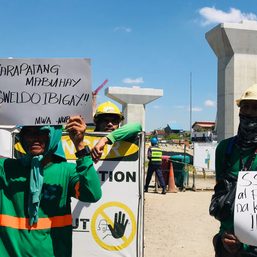SUMMARY
This is AI generated summarization, which may have errors. For context, always refer to the full article.
![[OPINION] How can we win the hearts and minds of Marcos Jr.’s working-class supporters?](https://www.rappler.com/tachyon/2022/03/ispeak-winningover.png)
In January 2001, I was a wide-eyed fourth year, graduating college student and it seemed like the entire country was completely gripped by the ongoing impeachment trial of then president Joseph “Erap” Estrada.
Despite mounting evidence in favor of the prosecution, Erap remained wildly popular, especially among the so-called masa or the country’s working people. But for many others including myself, it seemed like Erap was the greatest enemy of the country: he was corrupt and he stood for policies that actually hurt the masses. It was clear to us that everyone must unite to unseat him. And we were fully convinced that the masses would soon see the light and join us.
One night, after senators voted not to open an envelope containing an important piece of evidence, the entire country exploded in anger — or so it seemed to many of us then. It was already past 10 pm but I and many others found our way from Katipunan all the way to the EDSA Shrine. At first there were maybe just hundreds of us there. But as dawn broke and word spread around through text messages (this was the early years of the cellphone revolution), more and more people arrived. Before long, there were tens of thousands of us — and, soon, several hundreds of thousands of us!
I remember now how, in the months leading up to those days, people also argued in favor of building the biggest united front against the “primary enemy” or the “narrowest target,” of talking about important questions of what the next government should do next only after Erap resigns, and of just trusting GMA (who seemed like a saint sent from heaven then) to do the right thing.
I also remember now how we bristled at and angrily dismissed arguments by pro-Erap officials (and international journalists) that what we were doing was mainly a “middle-class” revolt: Sure, we were mostly middle-class but, as we never tired of pointing out, we did also have many from the lower classes with us and many more would come to join us, we assured ourselves.
Hoping to enjoin more students to participate, our student paper published an unprecedented special issue declaring “No Classes until Erap resigns!” on our front page. And indeed, few students and faculty came to campus in the days that followed: practically all my friends — including their mothers and uncles — decided to go to EDSA instead.
It was a giant protest action — the biggest I had ever joined. But it felt more like a giant party, or better yet — with so much free food being passed around — a giant picnic. It was fun! It was exhilarating! We were sleepless but we had so much energy! After a few days, as the crowd grew instead of dissipating, what we thought would never happen happened: Erap finally stepped down and I teared up watching Gloria Macapagal-Arroyo (GMA) take her oath of office before thousands of people. It was incredible. It was breathtaking. We won!
Did we really ‘win?’
But then, just three months later, after Erap was arrested, another unexpected development happened: at first, tens of thousands — and then later, maybe several hundreds of thousands more — came to occupy the very intersection we had occupied, demanding the very opposite of what we had only a few weeks before were demanding. They wanted Erap back in power!
I absorbed, from afar, just how so much more different they actually were from us: No Nokia 3210s in their hands. Many shabbily dressed or even just partly dressed. Some even had their karitons with them. No placards with clever slogans. No hampers overflowing with food to share around. Just their tired, unwashed, unperfumed bodies. The masa gathered together, exercising their political power, or just simply asserting their existence, in a way that I (and it seems many others from older generations) had never seen before.
My heart sank, and my head burst with questions — questions that have remained with me in the two decades that followed.
Like many students who went to my university, I was only starting to get “politicized” during those months. Having spent my early years in one of the country’s poorest provinces only to be suddenly whisked away to Manila and enrolled in an exclusive school for boys by my upwardly-mobile parents, I had come to be acutely curious about the huge gap between the rich and poor in the country — between many of my classmates and the friends and family I left behind in Samar. I had only started reading Marx and learning of “class,” thinking a lot about the masa, and engaging in debates about how we can best fight for them — or alongside them.
What I saw troubled and perplexed me: there, gathered on EDSA, the masa that I thought we were fighting for — that I thought would be on our side — still had not “seen the light.” And more disturbingly, there were way more of them than us.
Indeed, in the elections that followed, I and many others watched with consternation as so many of the pro-Erap candidates we denounced and mocked on EDSA won the elections by winning over the masa vote. And as we would later find out, so thin did GMA’s support base turn out to be that she actually felt compelled to cheat just to win the 2004 elections. Hello, Garci?
Dealing with defeat
2022 is of course very different from 2001; to suggest otherwise would be ridiculous. Still, I can’t help but look back to that pivotal moment in our country’s history and in my own life as I click on my friends’ pictures from all these big, fun, and inspiring rallies being organized by supporters of Leni Robredo – and as I despair over surveys and on-the-ground reports indicating that Marcos Jr. actually still enjoys stronger support from the ranks of the lower classes.
The differences between 2022 and 2001 should be noted, of course, but the continuities are also striking: Then as now, we see before us a yawning gulf between a well-organized but relatively smaller middle-class rallying behind a figure who appears to be relatively more reformist if not progressive, on one hand, and a much larger but relatively less organized lower classes rallying behind — or being captivated by — a populist and corrupt figure, on the other.
And then as now, we see a wide divide between the Left and those we seek to organize and mobilize for radical social transformation.
Looking back, I remain convinced that going there to EDSA on those historic nights of January 2001 was the right thing to do. Erap was corrupt. Erap was actually anti-poor. Erap had to go. But I wonder now whether there was a different way of doing things. What could we have done to overcome the chasm between us who wanted change and joined EDSA Dos and all of them who also wanted change but joined EDSA Tres? How could we have won the hearts and minds of Erap’s working-class supporters?
Then as now there’s a huge majority who aren’t on “our” side: those who can’t enjoy those soft-crispy croissants at Wildflour before joining rallies, those who can’t be chauffeured to political events in their SUVs, those who could work three jobs all year and still not be able to afford an Hermes bag. There is only one way to prevent Marcos Jr. from winning this May: we have to win these groups of people over. How do we do that? How do we talk to them? How do we get through to them? Or maybe the better question is: How do they get through to us? How do we get through to each other?
Twenty years after I confronted the above questions, I have to admit I still don’t know for sure. But this time, instead of simply repeating what I did in 2001, I have joined many others who have decided to try a different way.
Another way to win?
Instead of forging the largest coalition against the “primary enemy” by including even those who exploit and oppress the masa – such as those big capitalists opposed to minimum wage increases or those trapos blocking even just minor political reforms – we are attempting to forge the largest coalition by excluding all the oppressors and making sure this is articulated in our platforms and statements.
United front of the oppressed — of workers, professionals, small entrepreneurs, women, LGBTQ+, etc: yes! But alliances with billionaires, trapos, and chauvinist defenders of the patriarchy: no!
Instead of telling the masa, “Let’s talk about your grievances and your demands for higher wages, for lower food prices, for easing your tax burden, for land reform, for marriage equality, etc. only later after we have won, let’s focus on the ‘biggest enemy’ muna,” we’re saying, “Let’s talk about solutions to your problems now and let’s make them the centerpiece of our campaign precisely so we can appeal to the largest number of people and defeat the biggest enemy.”
Instead of saying, “Trust our leader, she’s open to discussion naman and she’ll be sure to fight for you when she’s in power na,” we’re saying, “Don’t trust anyone especially politicians. Trust only yourselves, trust only ourselves. Let’s fight for ourselves now and take power together.”
Thus, even as we respect and stand in solidarity with all those who support Leni and Kiko and their senatorial slate, we have decided to campaign instead for Ka Leody, Walden Bello, Luke Espiritu, and other non-trapo senatorial candidates. Or actually, to be more precise: we have decided to campaign not so much for these personalities — they’re just our spokespersons — but for ourselves. We are campaigning for a different vision. We are campaigning for our movement.
Optimism of the will
Will we succeed in getting through to the other side this time? Do we actually stand a chance of winning the hearts and minds of Marcos Jr.’s working-class supporters?
There are glimmers of light. In the course of going around giving flyers and posters, I and many others from our ranks have met first-hand so many BBM supporters among the masa who prove so much more open to our message than to those of other candidates as soon as they start getting to know our platform. We know of a growing number of erstwhile pro-Marcos Jr. voters or “undecideds” who have switched to Ka Leody.
But the odds are obviously stacked against us. Precisely because of our stance against billionaires, we have no billions in campaign funds; we can’t afford ads; we have a machinery that’s only starting to come together; etc. So our chances may be low this year.
Still we persevere for one reason: How will we ever know for sure that we won’t succeed now (or in the future) if we don’t even try – or if we just choose to keep doing the same thing over and over again while expecting a different result? And when are we going to start building the ground for future victories if we don’t start now? As a former editor in our student paper famously wrote in the 1980s: Kung hindi ngayon, kailan?
I don’t know for sure whether we will succeed – or at the very least, when we will succeed. I can only take comfort in the words of Antonio Gramsci, an Italian Marxist who also faced circumstances very similar to what we’re facing now — and who was martyred fighting someone resembling Duterte/Marcos in his own time. He said: “pessimism of the intellect, optimism of the will.”
I take this to mean the following: Let’s have the most realistic view of the situation possible. Let’s be painfully honest about our weaknesses. Let’s expect the worst. But in spite of it all, let us act to overcome our weaknesses; act in such a way as to make the seemingly impossible possible; fight as if victory were really within grasp.
Will that really work? Again, I can’t say for sure. There are no guarantees in struggle. All I know is that if we just do things like we did in 2001, then it is likely that 20 years from now, nothing would have changed.
Perhaps that won’t be so bad for all of us who can afford a Wildflour croissant. But I’m sure it’s not going to be fine for all of us who have been hungry for change all our lives. – Rappler.com
Herbert Docena, PhD is a full-time socialist organizer and a part-time lecturer in sociology.
Add a comment
How does this make you feel?


![[OPINION] Red alert! Can we be cheated out of our May 9 vote?](https://www.rappler.com/tachyon/2022/03/tl-f2-logistics.png?fit=449%2C449)
![[WATCH] In The Public Square with John Nery: Preloaded elections?](https://www.rappler.com/tachyon/2023/04/In-the-Public-Square-LS-SQ.jpg?resize=257%2C257&crop=414px%2C0px%2C1080px%2C1080px)
![[Newspoint] 19 million reasons](https://www.rappler.com/tachyon/2022/12/Newspoint-19-million-reasons-December-31-2022.jpg?resize=257%2C257&crop=181px%2C0px%2C900px%2C900px)

![[OPINION] The long revolution: Voices from the ground](https://www.rappler.com/tachyon/2022/06/Long-revolution-June-30-2022.jpg?resize=257%2C257&crop=239px%2C0px%2C720px%2C720px)
![[OPINION] I was called a ‘terrorist supporter’ while observing the Philippine elections](https://www.rappler.com/tachyon/2022/06/RT-poster-blurred.jpeg?resize=257%2C257&crop_strategy=attention)
![[OPINION] In a changing climate, how do we ensure safety and health at work?](https://www.rappler.com/tachyon/2024/04/Climate-change-safety-workers-April-25-2024.jpg?resize=257%2C257&crop_strategy=attention)



![[Episodes] Fairness to freelancers](https://www.rappler.com/tachyon/2024/02/Freelance-Writers-Guild-of-the-Philippines-rate-guide.jpg?resize=257%2C257&crop=217px%2C0px%2C720px%2C720px)
There are no comments yet. Add your comment to start the conversation.